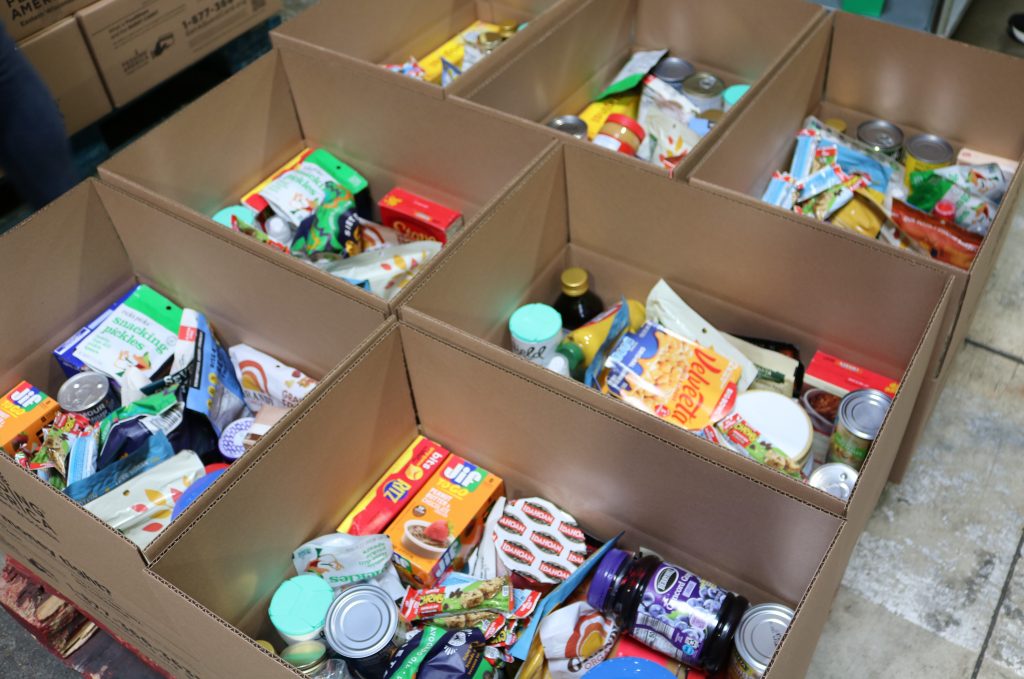Neighbors Launch Drive to Fill FoodShare Gap
Grassroots network connects volunteers with families in need.

Food pantry donations. Photo by Sophie Bolich.
While hundreds of Milwaukee families brace for the expected Nov. 1 pause in FoodShare funding, a grassroots effort is emerging to fill the gap.
Earlier this week, Meag Sargent and Jenny Holmdohl launched Milwaukee Grocery Buddies, a mutual aid network connecting individuals at risk of losing benefits with those willing to help.
The project, as of Thursday morning, has recruited approximately 100 volunteers to shop, deliver or donate. Nearly 80 households—many with three or more members—have requested assistance.
“The response has been incredibly overwhelming, both in terms of how many folks are reaching out for help and how many folks are signing up to make sure our neighbors have enough to eat,” Sargent told Urban Milwaukee via email.
Grocery Buddies gained traction on social media after a viral post showed a woman using her local Buy Nothing group to find people in need of groceries. The idea inspired others, including Sargent, to do the same.
Sargent made her own post, but requests quickly exceeded her personal capacity, so she recruited co-organizers to help spread the word. Holmdohl was among the first to sign on.
“I was raised by a single mom, so I saw firsthand how hard it can be to make ends meet—but also how deeply powerful community support can be,” Holmdohl said in an email. “Neighbors, friends and family ALWAYS showed up to help fill in the gaps, and that’s really shaped how I think about care and mutual aid.”
Through Milwaukee Grocery Buddies, volunteers are matched with households based on location and financial commitment, and can send money, shop and deliver groceries or arrange drop-offs via platforms like Instacart.
“My hope is that Milwaukee Grocery Buddies can offer some relief and stability for families facing unimaginable stress right now,” Holmdohl said.
The grassroots project coincides with a city-wide food drive, announced Tuesday, to bolster area food banks as demand spikes ahead of the anticipated pause. Sargent said she’d like to see the efforts work in tandem.
“Honestly, I think we should support both,” she said, referencing a statistic that the Supplemental Nutrition Assistance Program (SNAP) provides nine meals for every one Feeding America supplies. “Food banks and pantries do essential work, but they can’t meet every need. Ideas like grocery buddies help fill the gaps—offering consistent, reliable access to food and the peace of mind that comes with it.”
Grocery Buddies also preserves dignity and autonomy, allowing recipients to tailor their requests, she said. “Many food banks provide pre-packed boxes, which are helpful but don’t offer choice.” The delivery aspect further supports that mission, catering to those who aren’t mobile or lack access to reliable transportation.
Beginning this weekend, the ongoing government shutdown is expected to temporarily halt federal food assistance for millions of low-income Americans. Benefits typically roll over month to month, so remaining funds can still be used during the pause, but new benefits will not be added until the shutdown ends.
Governor Tony Evers has joined a multi-state lawsuit demanding that the Trump Administration use available federal funding to extend food assistance. Evers would need approval from the Wisconsin legislature to access state funding.
Milwaukee Grocery Buddies continues to accept new volunteers, with online interest forms for those wanting to get involved or request assistance.
Milwaukee Grocery Buddies is just one of many resources available across the city. For additional information, visit Milwaukee County’s Food Assistance page. Individuals can also call the 211 social services hotline for guidance.
If you think stories like this are important, become a member of Urban Milwaukee and help support real, independent journalism. Plus you get some cool added benefits.


















